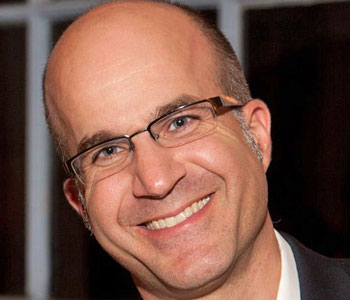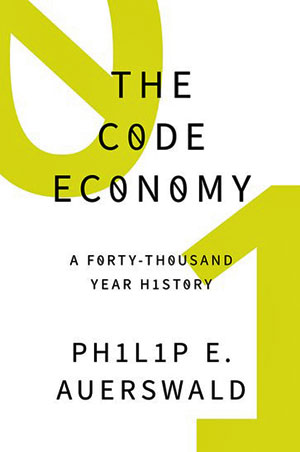
The Code Economy is a book about the past and likely future of human progress. My aim in writing it was to combine history with economics to explain how human societies have evolved over the span of millennia. At a time when concern about the future impacts of technological advances seems to grow daily, better understanding long-term trends is important because it helps us anticipate the future. I draw from the work of some of the great thinkers of the past four centuries who shared a deep interest in understanding the “how” of human productive activity: Gottfried Leibniz, Ada Lovelace, Charles Babbage, Claude Shannon, and Herbert Simon.
In the book, I use the word “code” to refer to the instructions and algorithms that guide production in the economy, or, how ideas become things. To convey the intuitive meaning of the concept I intend to communicate with the word “code,” as well as its breadth, I use two specific and carefully selected words interchangeably with code: “technology” and “recipe.”
The first half of the word “technology” derives from techné (τέχνη), which signifies “art, craft, or trade.” The second half derives from the word logos (λόγος), which signifies an “ordered account” or “reasoned discourse.” Thus, technology literally means “an ordered account of art, craft, or trade”— in other words, broadly speaking, a recipe.
The culinary recipe is not merely a metaphor for the how of production; the recipe is, rather, the most literal and direct example of code as I use the word. Anthropological research suggests that culinary recipes were the earliest and among the most transformative technologies employed by humans.
We have understood for some time that cooking accelerated human evolution by substantially increasing the nutrients absorbed in the stomach and small intestine. However, recent research suggests that human ancestors were using recipes to prepare food to dramatic effect as early as two million years ago—even before we learned to control fire and began cooking, which occurred about 400,000 years ago. Simply slicing meats and pounding tubers (such as yams), as was done by our earliest ancestors, turns out to yield digestive advantages that are comparable to those realized by cooking. Cooked or raw, increased nutrient intake enabled us to evolve smaller teeth and chewing muscles and even a smaller gut than our ancestors or primate cousins. These evolutionary adaptations in turn supported the development of humans’ larger, energy-hungry brain.
The first recipes—code at work—literally made humans what we are today.
That’s where the code economy begins.
We have all heard that we’re about to become obsolete, irrelevant. Or if not us, then, certainly, our children. No number of coding camps will help them. And definitely not travel soccer.
Algorithmically-powered robots have already beaten the best among us at chess, Jeopardy!, and, most recently, the famously difficult game of Go. Robots—or, at least, Big Data and algorithms—are already picking restaurants and romantic prospects for us. We now have robot bartenders on cruise ships, in Thailand they have robot food tasters, and, in Saudi Arabia … yes, robot camel jockeys.
In short, algorithms are getting so good, and are doing every sort of work performed by humans so well, that pretty soon there won’t be anything left for us to do.
That’s one story.
There’s another story you likely have also heard. That story is that we are on the cusp of a great Singularity. Humans transcend biology.
The advance of the algorithmic frontier will pull along the human species until we’re all man-machine cyborgs. Everyone one of us becoming Iron Man or Iron Woman.
So what will it be for our children? A Utopian Singularity? Or a Dystopian World without Work?
The story I tell in The Code Economy—the story that I believe reflects the true trend of history, going back not just decades but centuries and millennia—is neither of these.
The story that I tell is that—yes—robots, computers, and data-driven machines of all types are getting exponentially more powerful. And—no—we won’t be working the same way in twenty, ten, or even five years as we are today. But where the comparative advantage of machine over man will continue to grow in many areas of work, the human advantage will persist and endure indefinitely in others.
By economic default as well as by human choice, the future economy is overwhelmingly likely to be dominated not by work that consists of performing routinized tasks but by the capacity to continuously improvise new forms of value—creating for others at the same time as we grow our own capacities, and finding new recipes along the way.
The primary question facing human societies in the face of digital disruption is not whether opportunities for meaningful work will exist in the future. It is not even how such opportunities for meaningful work will be compensated. The question is more fundamental: It is about the nature of human productive activity and how we value what we create and share.
In my story, the answer to the question, “Is there anything that humans can do better than digital computers?” turns out to be fairly simple.
Humans are better at being human.

I’d be delighted if a “just browsing” reader were to gravitate toward the last third of the book, because that’s really where I explore the implications of the story for humanity’s present and near future.
One section that’s key to the narrative but that may—at first—seem incongruous in a book titled The Code Economy is the one about Burning Man in chapter 14, which is titled “Purpose: The Promised Sand.”
Burning Man is an annual gathering that draws about 70,000 people to the Nevada desert to create, and then live within, a temporary city—Black Rock City. Rather than a “festival” in any standard sense of the word, Burning Man is an ongoing social experiment in which a petri dish the size of downtown San Francisco is treated with a microbial growth medium that comes in the form of 10 principles and a semicircular urban plan.
The Promised Sand is, obviously, a play on words, juxtaposing the arid emptiness in which Burning Man occurs every year with the Biblical notion of “The Promised Land” as a place of glorious abundance. And, to be clear, the setting for Burning Man—the Black Rock Desert where Burning occurs every year—is indeed a vast emptiness.
What brings Black Rock City to life is not material abundance but rather an all-pervasive culture of participation. If Burning Man has a rule, it is “no spectators.” As Larry Harvey, the founder of Burning Man, says of the resources participants transport, at great cost and difficulty, to the Nevada desert: “The crucial question is what happens when they cross the city boundaries and decide what to do with those resources. The meaning isn’t stamped into the goods at the factory or something. The meaning derives from what they do with those goods and how they use those goods to connect with everybody here. That’s the curious nature of the economy at Burning Man.”
Yet—even while properly accounting for the singular nature of Black Rock City’s participatory culture—this aspect of the city generalizes. All cities are fed with resources from the outside, and meaning derives from what citizens do with those goods they draw from the outside— including how they use those goods to connect with others around them.
“I’ve always been very interested in scenes, particularly avant-garde scenes,” said Harvey when we spoke at Black Rock City in September 2015. Avant-garde scenes, he said, act as “a crossroads for people doing radical things seeming unrelated to one another. People start to meet one another, and bounce off one another, and share ideas with one another. That could be the Beats in America. That could be the Bloomsbury Group in London. It could be older scenes even before that, around folks going back since forever. We are that.” Harvey then paused, not for effect but for reflection. “Except we’re the first organization, I believe, that turned a Bohemian scene into a city,” he continued. “Usually scenes don’t do that.”

This may come as a surprise, but I actually think that The Code Economy is an important book. My justification for thinking so is that the raw material I had the pleasure to work with during the three years I was writing this book is as good as it gets—the insights of some of the people who, in the past four centuries, have most deeply considered the structure and evolution of human society in the long term. My role was to bring those insights together and organize them in a way that, I hope, is engaging and thought-provoking.
To be a bit blunt, the onslaught of information to which we’re all subject creates the danger of a collective myopia that turns ripples on the ocean of history into “news” while, deep below the surface, tsunamis of change pass unnoticed. This book is my effort to correct that myopia. We are not as different from our distant ancestors as we might imagine; the trends of history are not as difficult to discern; the likely future not as difficult to anticipate.
As a father of three daughters, two of whom are college-aged, I have an immediate interest in understanding what sort of opportunities the evolution of the economy is creating for the next generation. One widely communicated misconception is that the evolution of the economy is somehow reversible—that past eras of (usually imagined) greatness can be wished or commanded back into existence. No one below the age of forty thinks that is going to happen. An appreciation of evolutionary economics helps show why they’re right.
A less severe, but comparably prevalent, misconception is that, because digital technologies are driving the evolution of the economy, then the secret to success in the twenty-first century is learning how to code. This is only partially true. The real lesson of history is actually subtler: every time technology (or code) has advanced suddenly as is happening now, the effect has been to humanize—not to mechanize—work. This means that opportunities in the near future for the majority of people are far more likely to involve compassionate care, authentic expression, and/or culinary creativity as they are to involve mastery of Javascript or Python.
Of course, that the advance of code will continue to generate broadly shared benefits is hardly assured. There are things we can and must do to ensure that the future impacts of the advance of code are as advantageous as they have been in the past. The good news is that we’ve been adapting to, and benefiting from, the advance of code for more than 40,000 years. My hope in writing The Code Economy is that by understanding the momentum of history we can use it in our favor.


Philip Auerswald is a professor of public policy at the Schar School of Policy and Government, George Mason University; the co-chair and executive director of the Global Entrepreneurship Research Network, an initiative of the Kauffman Foundation; the cofounder and coeditor of Innovations, a quarterly journal about entrepreneurial solutions to global challenges published by MIT Press. Auerswald is the author or coauthor of nine books, including The Code Economy, featured in his Rorotoko interview, and over forty journal articles, book chapters, and professional reports. In 2014 he was invited to offer testimony in the first-ever congressional hearing on the peer-to-peer (sharing) economy.